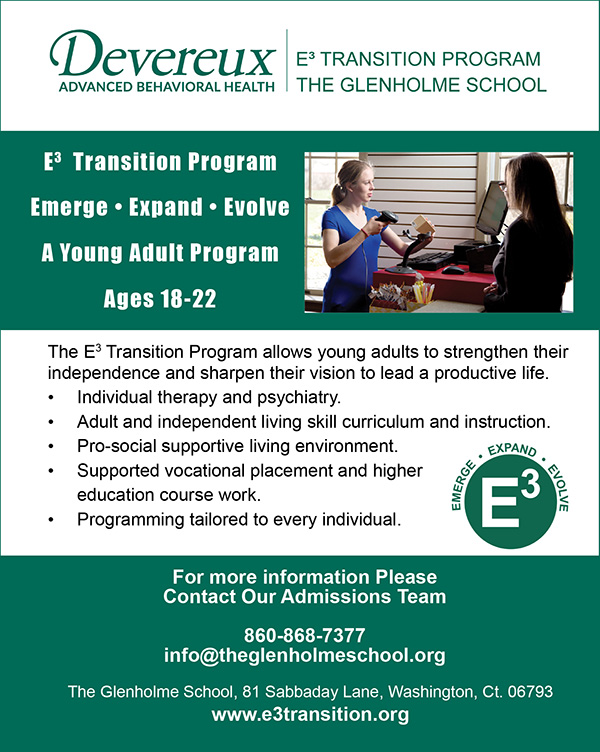A person-centered approach is vital for providing effective employment training for individuals with autism spectrum disorder (ASD). In an effort to capture the experiences of those who have received employment training, we conducted interviews with three members of the Devereux Pennsylvania Community Adult Autism Partnership Program (CAAPP) self-advocacy group: Emily Judovits, John Pagnoni and Trevor Marsh.

Recipients of Devereux’s community-based adult autism services help inform the direction of future programming.
The goal was to gather feedback from individuals receiving employment services and integrate this input with literature on evidence-based practices, identifying skills and training experiences that would have the greatest impact for individuals being served.
Through these interviews, three common themes emerged. Travel training, work-related social skills and gaining assistance from natural supports were identified as key areas for instruction to promote success in the employment setting. Emily, John and Trevor discussed the importance of these skills and the strategies that best helped them learn.
Behavioral Skills Training
During the interviews, Emily, John and Trevor identified repeated practice, including modeling, role plays and self-assessment as strategies that proved most effective in gaining job-related skills. These strategies are the core components of Behavioral Skills Training (BST), an evidence-based treatment package in which trainees rehearse target skills until mastery is demonstrated (Reid et al., 2003).
BST incorporates instruction, demonstration of the skill (modeling), practice (role-play) and feedback on how the skill was performed. This sequence is repeated until the person demonstrates competency with the skill. All individuals interviewed discussed the complexities of skills required at their jobs, including skills related to the task, and skills related to interacting with co-workers, supervisors and customers. The interviewees stated that repeated practice of different skills is critical for learning how to manage the variety of situations that can arise.
Social Skills
When working toward securing employment, social skills specific to the job can be a vital component in maintaining employment, while promoting positive relationships with supervisors and co-workers. A review completed by Wong et al. (2015) suggests a need for research focused on employment skills for individuals with ASD, particularly related to social and communication skills. Commonly occurring social situations in employment settings include interactions with a supervisor, co-worker, or customer. These situations might include asking for help, responding appropriately to corrective feedback, making confirming statements when given instructions, and notifying a supervisor when a task is completed (Bross et al. 2019; Grob, et al. 2019). Training loosely to account for novel situations and problem-solving opportunities is important to prepare someone for the unexpected, such as a customer requesting an obscure item in a retail setting or handling a difficult customer service situation.
While Emily described some instruction regarding social skills prior to employment, both she and Trevor stated they did not receive training on social skills for their work setting prior to starting their jobs. Both agreed they would have benefited from working on specific social skills relative to their positions, such as learning how to deal with difficult customers or recruiting assistance.
Natural Supports
Formal supports make use of job coaches, whose responsibility is to support an individual in learning the skills needed to independently fulfill the responsibilities of his or her job. Job coaches are a helpful, short-term support for those with autism; however, they might hinder individuals’ progress toward fully integrating into an employment setting by missing the development of relationships with co-workers (Mautz et al., 2001).
A natural support is someone who is already present in the work environment and agrees to provide support outside of his or her regular job responsibilities (Storey, 2003). Natural supports can help with job-specific skills (e.g., providing feedback and prompts, as necessary) and can assist individuals in integrating socially in the workplace in a more naturalistic manner (Storey, 2003).
Trevor discussed how natural supports were important to him, both on the job site and outside of work, stating: “My co-workers support me at work. One of them came to a fundraiser for autism supports and came and supported me.”
Additionally, a natural support may serve as an advocate in some scenarios for the supported co-worker. John provided an example of how natural supports are both necessary and looked upon with high regard by many supported employees. John said, “Having a natural support was helpful because it helped keep me on track and he was honest with me about what I needed to do to succeed at work.” John also reports his co-worker served as an advocate for him in challenging situations.
In order to build natural supports in the workplace, several areas need to be addressed such as: co-workers being open to providing support, staff turnover, and the difficulty of the task (Mautz et al., 2001). More research needs to address the best way to establish and maintain natural support connections to promote lasting success in the workplace.
Travel Training
One of the most important skills for the post-high school transition to employment is being able to use transportation independently (Gallup, Lamothe & Gallup, 2015). John, Emily and Trevor all indicated that learning to use transportation was a critical need for obtaining employment, yet only John received travel training when he was in school.
Limited research on travel training has focused on using public transportation (Lindsay & Lamptey, 2019). While research has demonstrated positive outcomes for teaching individuals how to use public transportation (Price, Marsh, Fisher, 2019), there are a number of significant barriers to using public transit as a main source of transportation. Many individuals do not have access to public transportation, and even those who do, may experience issues with wait times and regular availability (Pfeiffer et al., 2021). For these reasons, many people are turning to ride share services, including Uber and Lyft. These services are often widely available in areas not served by public transit. Importantly, adult service agencies are beginning to offer funding for using these services.
Future research will need to explore how identified best practices, such as BST, can be applied to teaching the skills needed to use ride share services. Emily pointed out important safety skills that need to be included in training, such as matching the car description/identification with the app and texting a family member/friend when using these services. It is also important to prepare individuals to cope with unpredictable situations. For example, recently, when Trevor’s Uber did not arrive on time, he needed to rely on his problem-solving skills to quickly identify an alternative solution to get to work. With this kind of thoughtful teaching, ride share services can greatly expand the options for transportation and access to meaningful employment.
Future Directions
Despite having some degree of instruction, Emily, John and Trevor all felt they would have benefited from receiving additional training before they transitioned to an employment setting. Employed individuals must be able to adapt when situations break down; learning flexibility and coping strategies are important for long-term success.
The skills our interviewees identified are complex and require significant practice with different examples before feeling comfortable. While effective technologies exist to teach and demonstrate these skills (e.g., BST), it takes time to build these repertoires. Employment social skills, working with natural supports and travel training need to be targeted during adolescence, with systematic teaching approaches in a variety of settings for individuals to be prepared for the workforce in adulthood.
Megan Robinson Joy, PhD, BCBA, is Director of Pennsylvania Autism Services at Devereux Advanced Behavioral Health. Ashley McClennen, MEd, LBS, is Clinical Manager, Sasha Birosik, BA, is Community Outreach Coordinator, Amanda L. Duffy, MEd, BCBA, LBS, is Program Director and Emily Judovits, Trevor Marsh, and John Pagnoni are Participants at the Devereux Advanced Behavioral Health Community Adult Autism Partnership Program (CAAPP). For more information, please contact Dr. Megan Joy at mjoy@devereux.org or 267-314-1292.
References
Bross, L., Travers, J., Munandar, V., Morningstar, M. (2019). Video Modeling to Improve Customer Service Skills of an Employed Young Adult with Autism. Hammill Institute on Disabilities. 34:4, 226-235.
Gallup, J., Lamothe, S., & Gallup, A. (2015). Enhancing transportation education using mobile devices and applications. Teaching Exceptional Children, 48:1, 54-61.
Grob, C., Lerman, D., Channing, L., Villante, N. (2019). Assessing and Teaching Job-Related Social Skills to Adults with Autism Spectrum Disorder. Journal of Applied Behavior Analysis, 52:1, 150-72.
Lindsay, S. & Lamptey, D. (2019). Pedestrian navigation and public transit training interventions for youth with disabilities: a systematic review. Disability and Rehabilitation, 41:22, 2607-2621.
Mautz, D., Storey, K., Certo, N. (2001). Increasing Integrated Workplace Social Interactions: The Effects of Job Modification, Natural Supports, Adaptive Communication Instruction, and Job Coach Training. Journal of the Association for the Severely Handicapped, 26(4), 257-269.
Pfeiffer, B., DeRita, J., Giacomucci, E., Gubler, J., Halteman, T., O’Donell, E., Seifired, G. & Pompanio, A. (2021). Barriers and Facilitators to Public Transportation Use of Individuals with Intellectual and Developmental Disabilities. Occupational Therapy in Mental Health, 37:1, 1-14.
Price, R., Marsh, A., & Fisher, M. (2018). Teaching young adults with intellectual and developmental disabilities community-based navigation skills to take public transportation. Behavior Analysis Practice, 11, 46-50.
Storey, K. (2003). A Review of Research on Natural Support Interventions in the Workplace for People with Disabilities. International Journal of Rehabilitation Research, 26 79-84.






